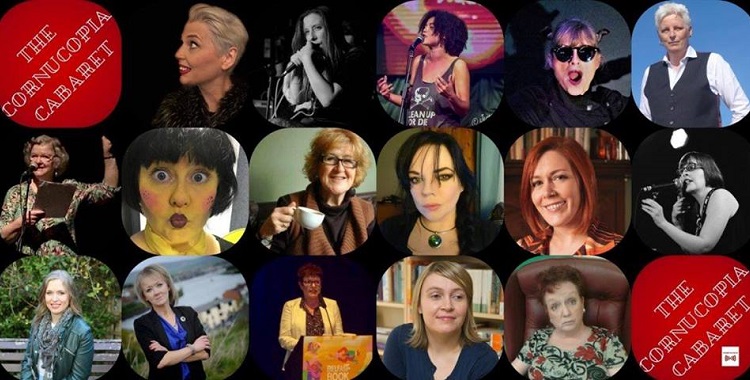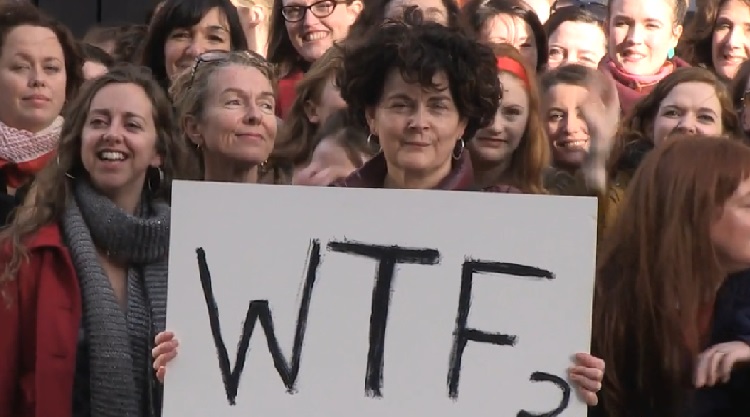Waking Up | Notes on International Women’s Day
I first became aware of International Women’s Day in 2010. I had friends in a theatre group and heard through the grapevine that they were putting on a play they had performed before: Eve Ensler’s The Vagina Monologues. Some of their members that had taken part before couldn’t make the dates of the new production and because of my association with the group and the fact that very few other women were willing to stand up on stage and repeatedly shout the word ‘Cunt’ at/with the audience (they’re welcome to join in; they don’t always do so), I got the part. It had very little to do with talent. But I’m a shouter and I enjoyed the part, not really thinking very much about why I was shouting this word that must be whispered, always, if not completely avoided.
I had a loose understanding that this lady who was shouting – who was, for those three nights in The Black Box, Belfast me – wanted to change things. Wanted to make this word that colloquially describes a part of the female anatomy but more commonly describes the worst of society: the dregs, the criminals, the murderers, the sickening people, the unintelligent people. Wanted to bring it back to the beginning. Wanted to make it the soft, sensuous thing it once was. No longer a word to insult men by comparing them to that worst thing of all: the vagina. I agreed with this woman who, those nights, was me. That play had other monologues, of course. One described rape, one described body hair causing marital strife, several described shame. There was a lot of shame. I noted this and put it to the back of my mind. But it was noted.
In the next few years I joined two all-male bands and sang a lot in bars. I did sound for some minor acoustic gigs, with most of the musicians being male. I noticed that questions, responses, general chit-chat were rarely directed towards me. Emails from people I had never met addressed me as ‘Dude’ and I firmly signed my name ‘Elizabeth’. I noticed I was left out of conversations even if I held the key information. This was noted.
The bands split up in the end, for various reasons and missing performing, I decided I would try poetry. A few friends wrote poems and I enjoyed their poems, admired their courage in reading them on stage. But I hadn’t a clue what to write about. I waited to be inspired. I waited quite a while. Then of all places, I was inspired by Twitter. A number of factors, not least being the 2014 murder of six people by Elliott Rodger in Isla Visa, California led to that most simple of things: a hashtag. Even though only two of the murdered were women, Rodger had stated on video that his intention was to take revenge on women. He had a manifesto that referred to his actions as a ‘War On Women’.
#yesallwomen came alive and women shared their stories of their sadness. The harassment they had experienced. Catcalls, assaults, stalkers… the stories rolled in under this hashtag and my poem was there. I wove stories of strangers with stories of my own – yes, I do have stories of my own – and I wrote a poem. I was, from then on, a poet.
In late 2015 I heard of a new group being set up. No, not a group, a community. It would be called Women Aloud NI and it would bring women writers in Northern Ireland together to perform in different towns and cities throughout Northern Ireland on International Women’s Day. I could do my poem!
I signed up and did my poem and that should have been that. After such a successful first outing though, the community decided to stay in touch with each other and do the same thing the following year. I was a poet now, naturally, so I stayed in the group. I wrote little pieces and took them to open mics throughout the year. Silly pieces, comedy pieces. But I kept coming back to what I didn’t understand. To the things that didn’t make sense, to the things that were a shame, because they caused shame. Why men are brave for speaking out about mental health when women are hysterical, overacting, overstating for attention. Why consent is assumed without a spoken yes, why women don’t know their own minds. Why women’s pain is treated less seriously by hospitals. I read article after article and these articles became part of me. Why abuse does not have to be physical to be abuse. Why the DUP want Northern Ireland to be treated exactly the same as the rest of the UK… except when it comes to those Godless laws on abortion. Why we’re between a rock and a hard place here in Northern Ireland and we are getting squeezed.

In 2018 I was approached by Culture Hub Magazine (which sadly folded late last year) to write an article about Women Aloud NI. In the interests of making the article well-rounded, I read a bit more about the origins of the group. Not just my story of joining, but creator Jane Talbot’s story of why the group existed in the first place. It began with an anthology. The Long Gaze Back: An Anthology of Irish Women was a short story anthology published in the South of Ireland in 2015. Out of 30 stories, only four were written by Northern Irish women which opened a conversation in Northern Ireland about community and togetherness and sisters doing it for themselves, rather than waiting to be discovered. But this ran concurrently to another, darker conversation.
When The Abbey Theatre, Dublin revealed its 2016 programme, ‘Waking The Nation’, there was an outcry that only one play out of the ten announced was written by a woman, with only three directed by women. The ‘Waking The Feminists’ campaign was created, with threefold objectives: “A sustained policy for inclusion with action plan and measurable results, championing and equal advancement of women artists, and economic parity for all working in the theatre.”
Economic parity though? The gender pay gap? Isn’t that just a myth? If you work a minimum wage job isn’t the minimum wage the same for everyone in the country? Yes, it is. That’s what I told myself for years as that’s what I knew. As an artist, you get familiar with zero hour contracts and minimum wage jobs. I knew I was getting paid the same as Steve the barman. You assume that when you rise in the ranks, your money rises. And it does. But the disparity also rises. Women can choose or be encouraged to work part-time to take care of their children. They get paid less for this and lose out on sick pay as well as other benefits. Women are less likely to put themselves forward for managerial positions because of outside responsibilities, lack of confidence or simply the knowledge that their workplace would not encourage this. Men are more likely to fill in application forms even if they do not meet the full criteria, as they have been taught to be go-getters, to take chances. Women view themselves through the eyes of the criteria and find themselves wanting. I can only touch on these issues briefly in this article but the Office For National Statistics is a website worth checking out should you wish to read more.

Then there’s the Canon. Not a gun, camera or a typo, but art. The definition is: “A list of authors or works considered to be central to the identity of a given literary tradition or culture.” Who do we think of in the North? Seamus Heaney, certainly. C.S. Lewis. Throwing the net wider to all of Ireland we have James Joyce, we have W.B Yeats, Bram Stoker. In 2017, Gerald Dawe edited The Cambridge Companion to Irish Poets. Guess what? There was a significant gender imbalance. Contributors were invited, and four out of thirty were women. Fired! Irish Women Poets and the Canon began, and made a mission statement or, as they call it, a pledge:
“As writers and academics, this is an absence we can easily address in future edited volumes. We propose to do so by means of a pledge, which we invite you to sign with us. Our pledge is short and simple. It commits us to asking questions about gender representation early on in collaborative projects such as edited collections, conferences and festivals. It commits us to withdrawing our participation when, in our opinion, insufficient effort is made to render representation fair.”
Fired!
regularly host showcase events with present day women writers reading their own work, and the work of a female poet from the past. A woman who should be Canon.
Every year International Women’s Day comes around on March the 8th and is met with derision. Hoots of laughter. “When is International Men’s Day?!” Well, it’s the 19th November and I’m not here to dismiss it or put it down. The theme for IMD 2019 is ‘Men Leading By Example.’ I think there are conversations to be had. Conversations about the past, the future and kindness. Conversations where we acknowledge that toxic masculinity exists, but it doesn’t have to. Instead of laughing at it, or denying it exists, talk to each other. Things are changing. Be part of the change.
